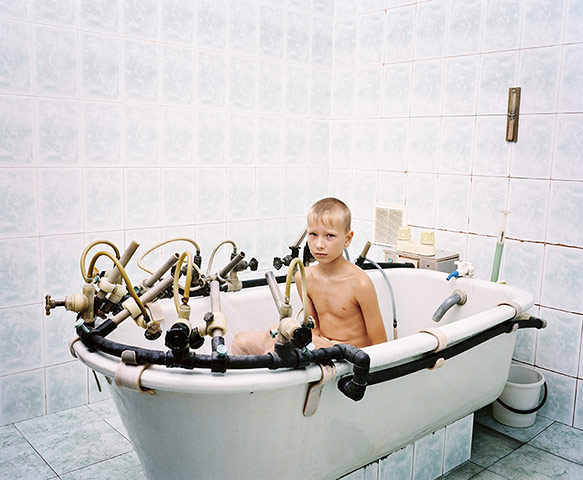
At the home of the Aschuba family, the enthusiastic grandfather lets us in. ‘If I’d known you were coming, I would have killed a goat,’ he says, and goes to the basement to fetch wine. His two grandsons, Zashrikwa, 17, and Edrese, 14, sit proudly with Kalashnikovs on their laps. Grandfather Tariel, 65, tells us about the escape to the Georgian city Kutaisi, when the first bombs fell. ‘We are mountain people. Borders don’t mean very much to us’
Photograph: Rob Hornstra/Flatland Gallery

Dima burned his legs at a wild barbecue party thrown by his parents. His doctor prescribed a visit to Matsesta, renowned for its magical sulfur baths. He now sleeps in one of the sanatorium’s rooms, and for six minutes three times a day he sits with his burned legs under running sulfurous water. Any longer and the remedial effects of the powerful water would be worse than the complaint, says his nurse Photograph: Rob Hornstra/Flatland Gallery

The road to Gimry – a centuries-old centre of the anti-Russian resistance – winds through stunning scenery. We stop to photograph the village from the other side of the valley, then two cars pull up and men in leather jackets get out. We are under arrest. ‘Can’t we go to Gimry?’ I ask the leather jackets. ‘Of course not,’ one of them replies Photograph: Rob Hornstra/Flatland Gallery

Every year, Mikhail Pavelivich Karabelnikov, 77, travels 3000 kilometres from Novokuznetsk to take his vacation in Sochi. He was a miner for 37 years and gradually worked his way up to foreman, in charge of 150 miners. His promising career came to an abrupt end when he refused to become a member of the Communist party, he says proudly
Photograph: Rob Hornstra/Flatland Gallery

Hamzad Ivloev, 44, was a policeman in Karabulak. One night he discovered a booby trap: a grenade had been lodged in a glass in such a way that the slightest movement would have set it off. At that moment, reinforcements arrived. He started screaming and telling them to run away, but no one responded. He decided to throw himself on the grenade. ‘In retrospect, it was all for nothing. I sacrificed myself for a bunch of cowards,’ he says bitterly
Photograph: Rob Hornstra/Flatland Gallery

This monument to Russian-Georgian Friendship, lonely and rundown, towers above the military highway, a feat of engineering at the time of its construction, some time between 1799 and 1817. The road was necessary for the Russians to conquer the Caucasus. It also made it easier for the Russians to protect the Georgians against the Ottoman and Persian empires, but consequently the Georgians forfeited their independence
Photograph: Rob Hornstra/Flatland Gallery

Nikolay Yefremovich Zetunyan, 88, sits in his living room with a magnificent view of the Black Sea. Despite the subtropical climate and stunning location, most of the houses in Eshera are empty. During the war with Georgia in 1993, the ethnic Georgians were driven out of the village and the young men and women were killed in the fighting. Nikolay believes that his time has come and he is making his own coffin
Photograph: Rob Hornstra/Flatland Gallery

Olga, 29, is the manager of a strip club in the Zhemchuzhina Hotel (meaning ‘pearl’) in the centre of Sochi. She hates it when people don’t understand that dancing is a form of art as well. Her dream is to start a family and have babies, she says. But whatever happens, she will continue dancing
Photograph: Rob Hornstra/Flatland Gallery

Geologists, lawyers, environmentalists and concerned citizens photographed at the city’s Geographic Society. At this gathering, discussions ranged over the latest Olympic plans and how to limit the environmental damage, contest the forced removals – and ultimately keep the Games out of Sochi. They talked about the possibility of moving the ice-skating rinks further north. Then off they would go, carrying files bulging with cases on land ownership, expropriation, protected trees and theories about underground lakes that in due course would swallow the skating rinks whole
Photograph: Rob Hornstra/Flatland Gallery

